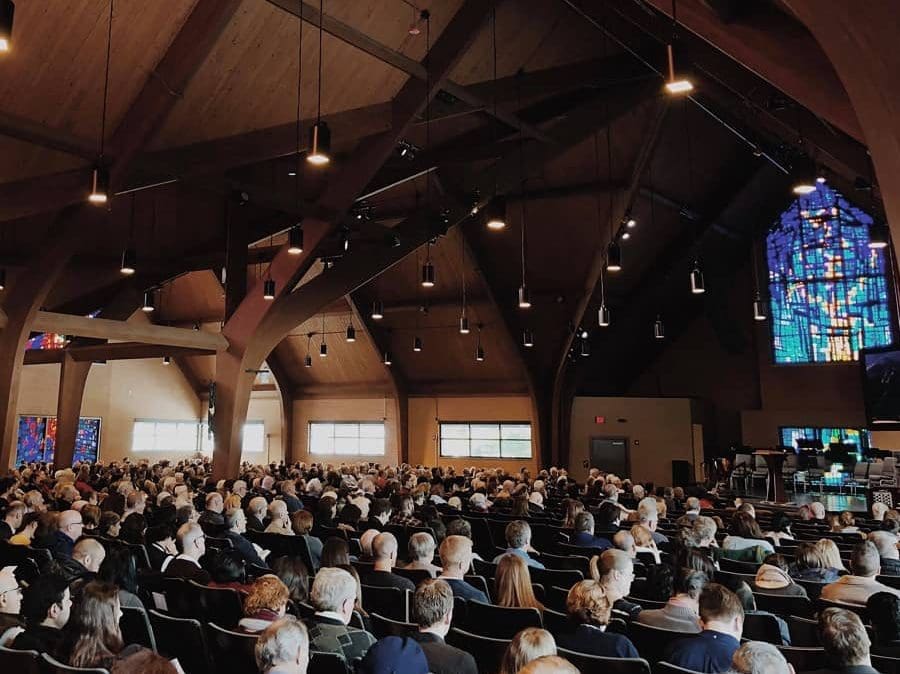
The Hike
Nature
Romans 7:21–8:17

When Adam and Eve committed the first sin, there were two long-term consequences: sin brought a penalty against them, and it became a power within them. We need saving from both, and this session is about how we can overcome the power of sin. We are going to meet three characters: Hostile, Helpless, and Hopeful. Try to decide which of them you identify with most. Then we will see what God has to say to each of them and to us.
Some years had passed since John first used drugs at a party. He said he wouldn’t do it again, but he found that he couldn’t stop. He had a hard time admitting that he was hooked, but his friends knew that was the truth.
Then one day, John was caught in possession. The police pressed charges, and the court set a heavy fine. There was a penalty to pay, and John had no money.
After a lot of soul searching, John’s mother paid the fine on his behalf, but afterwards she wondered if she had done the right thing. “I’m afraid that by paying the fine, I’m just enabling him to continue his habit,” she said.
She’s right. John is an addict. The drugs are exercising a power in his life, and that power must be broken.
If John is to overcome the power of his addiction, he will need both the desire and the ability to say no. But John doesn’t seem to have the desire. And even if he did, does he have the ability?
Hostile: No Desire and No Ability
In Romans 8, Paul describes a person who is hostile to God: “The mind that is set on the flesh is hostile to God, for it does not submit to God’s law; indeed, it cannot” (Romans 8:7). Hostile has neither the desire nor the ability to obey God’s law.
At one time, Paul himself was hostile. He led a furious persecution of Christian believers, “breathing threats and murder against the disciples of the Lord” (Acts 9:1). That’s hostile!
But while Paul was traveling on the road to Damascus, the risen Lord Jesus Christ appeared to him, and said, “Why are you persecuting me?” (Acts 9:4). Paul’s violent anger against Christians was actually a reflection of a deeper rage in his heart against Christ.
You don’t have to look too far to meet Hostile in our society today. He gets angry about the public mention of God, and he is offended by the suggestion that there is a God to whom we are all accountable.
Kind and reasonable people can become hostile when it comes to the things of God. Have you noticed that a conversation can be quite civil until God’s name is introduced? It is as if a switch is triggered and a deep hostility within the soul is exposed.
Helpless: Desire without Ability
In Romans 7, we meet another character whom we will call “Helpless.” The big difference between Helpless and Hostile is that while Hostile hates God’s law, Helpless loves it. “I delight in the law of God, in my inner being,” he says (Romans 7:22).
The problem for Helpless is that while he loves God’s law, he isn’t able to obey it. He says, “I have the desire to do what is right, but not the ability to carry it out” (7:18).
Helpless is a mystery to himself. He does not do what he wants to do, and he ends up doing what he never intended (7:15). This lack of power leaves him feeling absolutely miserable. “Wretched man that I am!” he says. “Who will deliver me from this body of death?” (7:24).
Hopeful: Desire with Ability
In Romans 8, we meet a third character whom we will call “Hopeful.” Like Helpless, Hopeful wants to live in a way that is pleasing to God. The big difference between them lies in the area of ability.
Paul tells Hopeful to “put to death the deeds of the body” (Romans 8:13), and that is precisely what Helpless could not do. But Hopeful is in an entirely different position. He has the desire to fight against sin in his life, and he has the ability to prevail because the Spirit of God lives in Him.
Helpless and Hopeful face the same struggles. They feel the pull of the same temptations. The difference between them lies not in the battle but in the outcome. Helpless faces inevitable defeat; Hopeful will enjoy ultimate victory.
The Proper Application of Overwhelming Force
When Pearl Harbor was attacked on December 7, 1941, Winston Churchill was at Chequers, the British Prime Minister’s country retreat. On hearing the news, he called President Roosevelt, who said, “We are all in the same boat now.”
Churchill recorded his thoughts as he went to bed that night. “No American will think it wrong of me if I proclaim that to have the United States at our side was to me the greatest joy… We had won after all. Yes, after Dunkirk; after the fall of France… after seventeen months of lonely fighting and nineteen months of my responsibility in dire stress. We had won the war. England would live; Britain would live…
“How long the war would last or in what fashion it would end no man could tell, nor did I at this moment care… All the rest was merely the proper application of overwhelming force… Many disasters, immeasurable cost and tribulation lay ahead, but there was no doubt about the end… I went to bed and slept the sleep of the saved and the thankful.”1
The war would drag on for another four years. It would continue to be a bitter struggle, but even in December 1941, Churchill could say, “We had won the war.” The outcome was certain. Churchill had been helpless. But now he was hopeful. The difference lay in the involvement of an “overwhelming force.”
The problem with Helpless is that he is limited to the range of his own ability. That’s why he finds the Christian life impossible. In Romans 7, Helpless says nothing about Christ or about the Spirit. He only talks about himself and his own limited abilities, which are insufficient to fulfill the law of God.
But when you belong to Christ, the Holy Spirit lives in you. You are not helpless, so don’t talk as if you were. God has placed you in an entirely new position in Christ. You will face the same battles as you did before, but there will be a different outcome.
Identify Your Position
Maybe you feel there is a sin that is too strong for you. You are tired of fighting it, and you feel defeated.
I’ve often had a conversation with someone who comes to speak with me about a temptation that is overwhelming to him. “It’s too strong for me,” he says. “I’m helpless to overcome it.”
So I say to him, “Let me lead you to Christ.”
Then he will say to me, “Oh no, pastor, I’ve been a Christian for many years!”
“Well now, wait a minute. If you are a Christian, the Holy Spirit lives in you. How can you say that you are helpless?”
For a Christian to say “I am helpless” is to repeat the lie of the devil. If you are helpless, come to Christ. But if you have come to Christ, the Holy Spirit lives in you. So stop telling yourself that you are helpless.
With which of our three friends do you most closely identify: Hostile, Helpless, or Hopeful? It’s important to answer this question, so that you can hear what God has to say to you.
God’s Word to Hostile
If you’re hostile, God offers an amnesty to you. He invites you to lay down your arms, and He calls you to repent (Romans 2:4). Repentance is giving up your resistance to God. Jesus Christ came into the world and went to the cross, so that those who were once God’s enemies could become His friends.
God showed His love for us while we were still hostile toward Him (5:8). He has loved you through all your struggling, all your resisting, and all your fighting against Him. He loves you still, even in your hostility. You have nothing to lose and everything to gain by turning to Him in repentance.
God’s Word to Helpless
God’s word to Helpless is quite different. Telling Helpless to repent won’t help him. He already wants to do what is right. His problem is that he doesn’t have the power.
When Helpless cries out in despair, “Who will deliver me from this body of death?” God’s answer is “Jesus Christ” (7:25).
Come to Christ in faith. Tell Him that you cannot live this life on your own. Tell Him that you need the power of His Holy Spirit, so that you will have the ability as well as the desire to live a new life. Ask and you will receive. God will give you a new name. You will no longer be Helpless; you will be Hopeful.
God’s Word to Hopeful
God’s Word to Hopeful is to put to death the misdeeds of the body by the power of the Spirit (8:13). Start an intentional battle against the sins that remain in you. Learn to fight, and don’t ever say that you are helpless. The Spirit of God is within you. Christ has put you in a position to fight and to win.
Are you making a proper application of overwhelming force? Can you identify specific sins on which you are launching an intentional assault at this point in your life? Have you formed a strategy for change, knowing that the power of the Spirit has been given to you to make this possible?
Remember that the enemy will try to confuse you about your position. He loves to tell Hopeful that he is really Helpless. Many of his greatest successes come from that kind of propaganda. So identify your position, and then follow God’s instructions. If you are hostile, repent—God’s love reaches out to you. If you are helpless, come—Christ will deliver you. If you are hopeful, fight—the Holy Spirit is within you.
Opened
The power that you have depends entirely on your spiritual position. Without Christ, the Christian life is beyond your power. But when you come to Christ in faith, He gives you His Spirit. And that puts you in an entirely different position.
You will face many struggles, and you will have many defeats as well as victories. But you are not alone in this battle. The Spirit of God is within you, and He makes the Christian life possible. The Christian life is all about the proper application of overwhelming force. Never say you are helpless when the Spirit of God lives in you.
Notes:
1. Winston Churchill, The Second World War (Mariner, 1986). 3.475–477.
Romans 7:21–8:17
21 So I find it to be a law that when I want to do right, evil lies close at hand. 22 For I delight in the law of God, in my inner being, 23 but I see in my members another law waging war against the law of my mind and making me captive to the law of sin that dwells in my members. 24 Wretched man that I am! Who will deliver me from this body of death? 25 Thanks be to God through Jesus Christ our Lord! So then, I myself serve the law of God with my mind, but with my flesh I serve the law of sin.
Life in the Spirit
1 There is therefore now no condemnation for those who are in Christ Jesus. 2 For the law of the Spirit of life has set you free in Christ Jesus from the law of sin and death. 3 For God has done what the law, weakened by the flesh, could not do. By sending his own Son in the likeness of sinful flesh and for sin, he condemned sin in the flesh, 4 in order that the righteous requirement of the law might be fulfilled in us, who walk not according to the flesh but according to the Spirit. 5 For those who live according to the flesh set their minds on the things of the flesh, but those who live according to the Spirit set their minds on the things of the Spirit. 6 For to set the mind on the flesh is death, but to set the mind on the Spirit is life and peace. 7 For the mind that is set on the flesh is hostile to God, for it does not submit to God’s law; indeed, it cannot. 8 Those who are in the flesh cannot please God.
9 You, however, are not in the flesh but in the Spirit, if in fact the Spirit of God dwells in you. Anyone who does not have the Spirit of Christ does not belong to him. 10 But if Christ is in you, although the body is dead because of sin, the Spirit is life because of righteousness. 11 If the Spirit of him who raised Jesus from the dead dwells in you, he who raised Christ Jesus from the dead will also give life to your mortal bodies through his Spirit who dwells in you.
Heirs with Christ
12 So then, brothers, we are debtors, not to the flesh, to live according to the flesh. 13 For if you live according to the flesh you will die, but if by the Spirit you put to death the deeds of the body, you will live. 14 For all who are led by the Spirit of God are sons of God. 15 For you did not receive the spirit of slavery to fall back into fear, but you have received the Spirit of adoption as sons, by whom we cry, “Abba! Father!” 16 The Spirit himself bears witness with our spirit that we are children of God, 17 and if children, then heirs—heirs of God and fellow heirs with Christ, provided we suffer with him in order that we may also be glorified with him.
(ESV)
Use these questions to further engage with God's Word. Discuss them with another person or use them as personal reflection questions.
Take the First Step to Open Your Bible
Join 35,000+ people who get ‘Open Today’. Every Wednesday you’ll get resources designed to inspire, encourage, and challenge you in opening your Bible.
Spend 31 days in Psalm 23 with this new book from Pastor Colin Smith for your gift of any amount in April!


